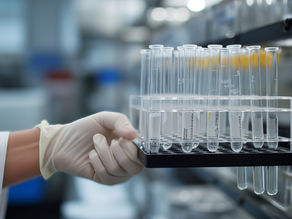top of page

Explore Applied Science with our Revision Blog
Discover the ultimate resource for applied science revision with AST Blog. Our platform is dedicated to providing you with expert tips, exam strategies, and in-depth explanations tailored to both GCSE and BTEC Applied Science.
Whether you're tackling challenging questions or seeking to understand complex topics, our blog is your go-to guide for success. Stay ahead in your studies with our applied science revision materials, designed to empower and inspire you throughout your educational journey. Start today and achieve your science goals!


Antibiotic Resistance: A Growing Threat to Modern Medicine
Antibiotic use is a growing problem due to overuse Antibiotics have been one of the most important medical discoveries of the last 100 years. They are used to treat bacterial infections such as pneumonia, tuberculosis, and wound infections. However, their effectiveness is now being threatened by antibiotic resistance , which is recognised globally as a major contemporary scientific issue. What Is Antibiotic Resistance? Antibiotic resistance occurs when bacteria evolve so tha

PM
1 day ago3 min read


Effect of Temperature on the Rate of Amylase Digestion of Starch
How to Write a 12-Mark Investigation Plan In the BTEC Applied Science Unit 3 exam, learners are asked to write a scientific plan for an investigation. This question is worth 12 marks, so it is important to write clearly, logically, and include all required sections. This blog post explains how to structure your plan using the example investigation: the effect of temperature on the rate of digestion of starch by the enzyme amylase. 1. Writing a Clear Hypothesis A hypothesis is

PM
7 days ago5 min read


Thinking about Science Tuition?
Science can sometimes feel like a tough subject to master. Whether it’s GCSE, A-Level, or BTEC Applied Science, the concepts can be challenging, and the pressure to perform well is real. That’s where science tutoring steps in to make a difference. I want to share how science tutoring works, especially in the online world, to help you or your child feel more confident and succeed in science studies. Understanding Science Tutoring Science tutoring is all about personalised supp

PM
Feb 24 min read


Mastering Harvard Referencing for BTEC Applied Science Unit 6
Much knowledge comes from books When writing reports or assignments in Applied Science, you’ll often need to show where your information came from. Whether you’re explaining a chemical process, describing a piece of equipment, or analysing results from your own investigation, you must give credit to the original source. That’s where Harvard referencing comes in. What Is Harvard Referencing? Harvard referencing is a system used to acknowledge the work of other people when y

PM
Jan 274 min read


Understanding Enzymes: A Key Topic in Unit 3
The Importance of Enzymes in Science Education Enzymes are a crucial topic in Unit 3. They allow students to showcase both their biological understanding and practical investigation skills. Understanding enzymes not only enhances your grasp of biology but also helps in practical applications. At a basic level, enzymes are proteins. They consist of long chains of amino acids joined together by peptide linkages. These chains fold into a specific three-dimensional shape, and it

PM
Jan 194 min read


Understanding ECG Traces – A Guide for BTEC Applied Science Students
When you study Principles and Applications of Biology I and II, one of the key topics in the cardiovascular system is the electrocardiogram, or ECG. This simple but powerful test records the electrical activity of the heart and is one of the most common diagnostic tools used in medicine today. What Is an ECG? Every time your heart beats, electrical impulses spread through the muscle tissue, making it contract in a coordinated way to pump blood. An ECG (electrocardiogram) dete

PM
Jan 123 min read


How to Tackle Question 5 in BTEC Applied Science Unit 7
Science is around us Question 5 is often the highest-mark question in the Unit 7 exam — and it’s the one students find most intimidating. That’s because it asks you to do more than just recall facts. You are expected to communicate science clearly, use all three articles, and show that you understand the bigger picture. The good news? Once you understand what the examiner is really looking for, Question 5 becomes very manageable. What is Question 5 actually testing ? Quest

PM
Jan 64 min read


Unit 7 Contemporary Issues in Science - Question 4
Question 4 often looks short and simple — but it’s an easy place to lose marks if students don’t understand what examiners really want. Let’s break it down. What Does Question 4 Ask You to Do? “Suggest potential areas for further development and/or research of the scientific issue from the three articles.” (5 marks) Scientific research This question is not about repeating what the articles already say. Instead shown you can: Think like a scientist Spot gaps or limitations

PM
Dec 29, 20253 min read


Unit 7 Contemporary Issues in Science - Question 3
A clear guide to tackling the ‘scientific article analysis’ question If you’re preparing for the Unit 7: Contemporary Issues in Science external exam, you’ll know that Question 3 is one of the most difficult questions on the paper . It tests your ability to interpret, analyse, and evaluate scientific information. 🧠 What is Question 3 about? Question 3 is worth 12 marks and is built around a scientific article presented in the exam paper. You are expected to consider how

PM
Dec 22, 20254 min read


The Difference Between Ionic and Covalent Bonds
When atoms combine, they form chemical bonds that hold them together. The two main types of bonding you’ll study in Unit 1 are ionic and covalent bonds. Understanding the difference helps explain why substances have different properties — from the salt on your chips to the water in your glass. Ionic Bonding An ionic bond forms when electrons are transferred from one atom to another. This usually happens between a metal and a non-metal. Metals lose electrons, forming positive

PM
Dec 15, 20252 min read


How to Answer Atomic Radius and Ionic Radius Exam Questions (GCSE & BTEC Applied Science Guide)
Have you ever seen a question like this in your chemistry paper? “Discuss the atomic radius and ionic radius data in the table” It’s a classic exam favourite — and one that can easily earn you full marks if you know what the examiner is looking for. Let’s break it down step by step. 🧪 Step 1: Understand What the Question Is Really Asking This type of question wants you to: Describe the data in the table (what happens to the numbers). Explain the trends using your understandi

PM
Dec 9, 20253 min read


Differences and Similarities Between PV Curves for a Carnot Engine and a Real Engine
Unit 5 Physics - engines

PM
Dec 2, 20254 min read


Spirometry and How to Interpret It
Spirometry trace What Is Spirometry? Spirometry is a common method used to measure how well a person’s lungs are working. It records the volume of air breathed in and out and the speed of breathing. The results are shown on a graph called a spirometer trace, which helps scientists and healthcare professionals assess lung function and detect respiratory problems such as asthma or chronic obstructive pulmonary disease (COPD). In Unit 5, you learn how to interpret these traces a

PM
Nov 25, 20253 min read


Unit 7 Contemporary Issues in Science - Question 2
BTEC Applied Science – Unit 7: Contemporary Issues in Science Understanding the Question Question 2 on the Unit 7 paper typically asks: “Identify the different organisations/individuals mentioned in the articles and suggest how they may have an influence on the scientific issue.” (6 marks) This question assesses Learning Aim A2, which focuses on understanding how various groups and individuals impact scientific progress, research, and public opinion. What You Need to Do: Iden

PM
Nov 17, 20253 min read


Explaining chromatography
BTEC Applied Science – Unit 2, Learning Aim C Paper chromatography Chromatography is one of the most important analytical techniques in science. In Unit 2, Learning Aim C, you’ll explore how chromatographic methods such as paper chromatography and thin-layer chromatography (TLC) can separate and identify substances in a mixture. These techniques are widely used in forensic science, food testing, and pharmaceutical analysis — so understanding how they work is essential for you

PM
Nov 10, 20254 min read


What Is Ionisation Energy?
When atoms gain or lose electrons, they become charged particles called ions. The energy needed to remove those electrons is known as ionisation energy — a key idea in atomic structure and periodicity. Definition Ionisation energy is the energy required to remove one mole of electrons from one mole of gaseous atoms to form one mole of gaseous positive ions. For example: First ionisation energy for aluminium This process requires energy because the electron is attracted to the

PM
Nov 3, 20253 min read


Electrolysis of Molten Alumina
Aluminium airplane Aluminium is one of the most widely used metals in the world. It is strong, lightweight, and corrosion-resistant, which makes it useful for aircraft, drink cans, window frames and electrical cables. But extracting aluminium from its ore is not simple — because aluminium is too reactive to be extracted by reduction with carbon. Instead, we use electrolysis. The process used to extract aluminium is called the Hall–Héroult process, and it involves the electrol

PM
Oct 28, 20253 min read


Understanding Stationary Waves: A Comprehensive Guide
What are Stationary Waves? Stationary waves are formed when two identical waves travel in opposite directions and interfere with each other. This often occurs when a wave is reflected back on itself, such as on a string fixed at both ends. The waves superpose (combine) — in some places, they reinforce each other ( constructive interference ), while in others, they cancel out ( destructive interference ). The result is a wave pattern that appears to stand still: nodes and an

PM
Oct 21, 20253 min read


Understanding Diffraction and Its Applications
When light, sound, or any type of wave encounters an obstacle or a gap, it doesn’t always just stop or bounce back. Instead, the wave can bend around the edges or spread out after passing through an opening . This phenomenon is called diffraction . Light being diffracted in glasses lenses What is Diffraction? Diffraction happens when waves encounter: An edge (e.g. water waves bending around a harbour wall) A slit or gap (e.g. light passing through a narrow slit and spreadi

PM
Oct 16, 20253 min read


Safe and Effective Science Tutoring Online
Finding the right support in science can make all the difference. Whether you're tackling GCSE, A-Level, or BTEC Applied Science, having a tutor who understands your needs and keeps you safe online is essential. I want to share some warm, practical advice to help you feel confident and secure while learning science online. Together, we’ll explore how to make the most of your tutoring experience with safety and effectiveness at the heart. Why Choose Online Science Tutoring? On

PM
Oct 10, 20253 min read
bottom of page
